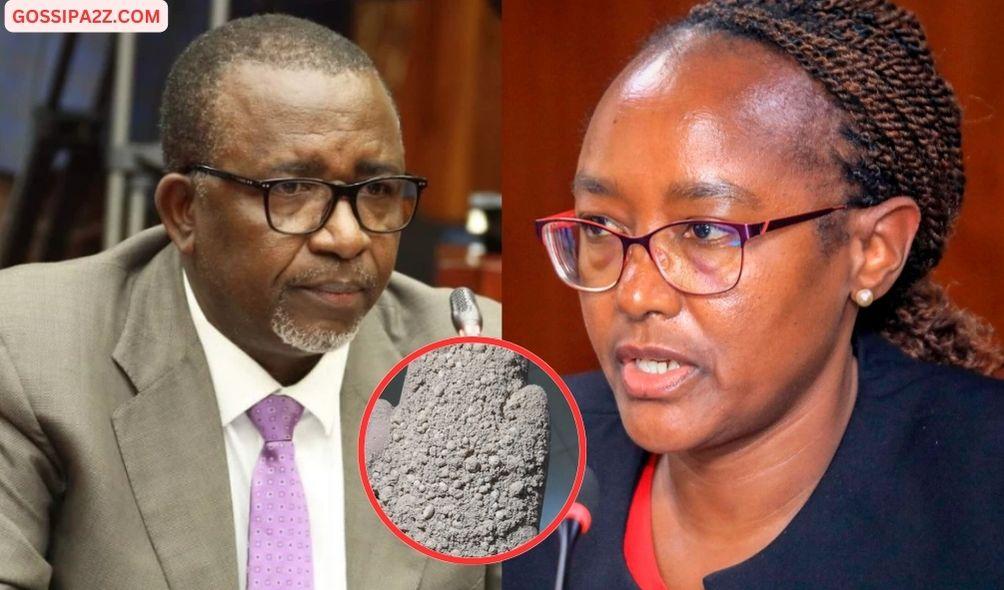KEBS Denies Role in Kenya’s Fertilizer Scandal: Senate Testimony Unveils Contradictions
The controversy over the sale of alleged counterfeit fertilizer intensified as the Kenya Bureau of Standards (KEBS) denied participating in the testing of the products distributed under President William Ruto’s subsidy program.
On Friday, April 19, Esther Njeri, CEO of the Kenya Bureau of Standards (KEBS), testified before the Senate Standing Committee on the Distribution of Fake Fertilizer. She stated that the bureau was not involved in the distribution, which contradicts earlier claims made by Agriculture Cabinet Secretary Mithika Linturi.
“In the entire process of tendering and procurement of the fertilizer under the subsidy program, KEBS was not involved at all,” Njeri stated emphatically.
The hearing follows allegations made by CS Linturi ten days prior, accusing KEBS of being responsible for the distribution of low-quality fertilizer in the market.
Linturi had told the Senate Agriculture Committee that the blame squarely fell on KEBS, though he differentiated between “fake” and “substandard” products. “If the percentage of nutrients does not meet the required levels, this does not mean the fertilizer is fake,” Linturi argued.
Njeri explained that KEBS’s role was restricted to a request made on March 22 to examine the quality of the fertilizer being sold by the National Cereals and Produce Board (NCPB). This indicates that there was no prior participation in the testing procedures before that date.
ALSO READ:
- “Two Groups, One Agenda”: Gachagua Accuses Raila of Secret Political Deals
- Exclusive: Ida Odinga’s 75th Birthday Party in Karen (Photos)
- FKF President Discloses Exact Amount Paid to Harambee Stars Players
- Gachagua’s Ally Senator John Methu Admits Ruto Might Win 2027 Elections
- Maraga Explains Why He Hasn’t Campaigned in Kisii Despite 2027 Bid
The discussion about the quality of fertilizers heightened when KEBS announced that 5,840 bags of counterfeit fertilizer had been seized across the country earlier this month. This news sharply contradicts the ongoing narrative from the Agriculture Ministry, where Linturi admitted to problems with 3,000 bags, of which 516 have been recovered and are currently being tested by the Kenya Revenue Authority.
In a dramatic turn of events, the scandal has already resulted in the suspension of eight KEBS officials. These individuals were interdicted due to their alleged involvement in the issuance of certification and quality marks to two companies linked to the sub-standard fertilizer.
The administration led by President Ruto is firmly dedicated to providing farmers nationwide with 12.5 million bags of subsidized fertilizer, especially in preparation for the upcoming long rainy season.
In August last year, Ruto announced a Ksh12 billion investment in fertilizer subsidies, aimed at eliminating the middlemen or “cartels” previously implicated in the distribution chain. “We have fully done away with fertilizer brokers to fully be aware of who is receiving them and in what quantity,” Ruto stated, highlighting the government’s efforts to ensure transparency and efficiency.
The Ministry of Agriculture and Livestock Development reports that since the start of the National Fertiliser Subsidy Programme (NFSP), up until July 30, 2023, around 3.5 million 50 kg bags of subsidized fertilizer have been provided in 41 out of the nation’s 47 counties.
Given these disclosures, certain lawmakers are stepping up their scrutiny and demanding greater accountability, especially focusing on CS Mithika Linturi.
KEBS Denies Role in Kenya’s Fertilizer Scandal: Senate Testimony Unveils Contradictions
